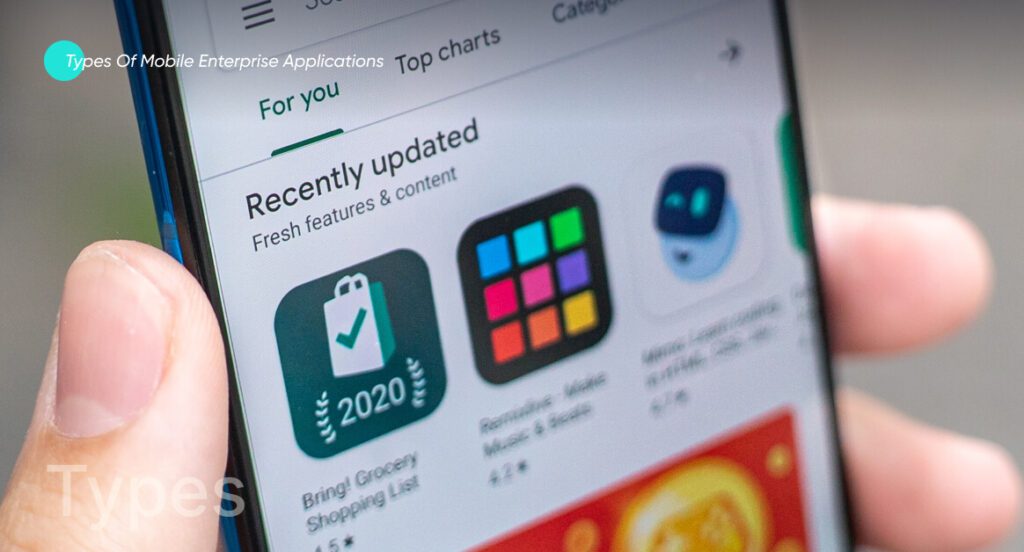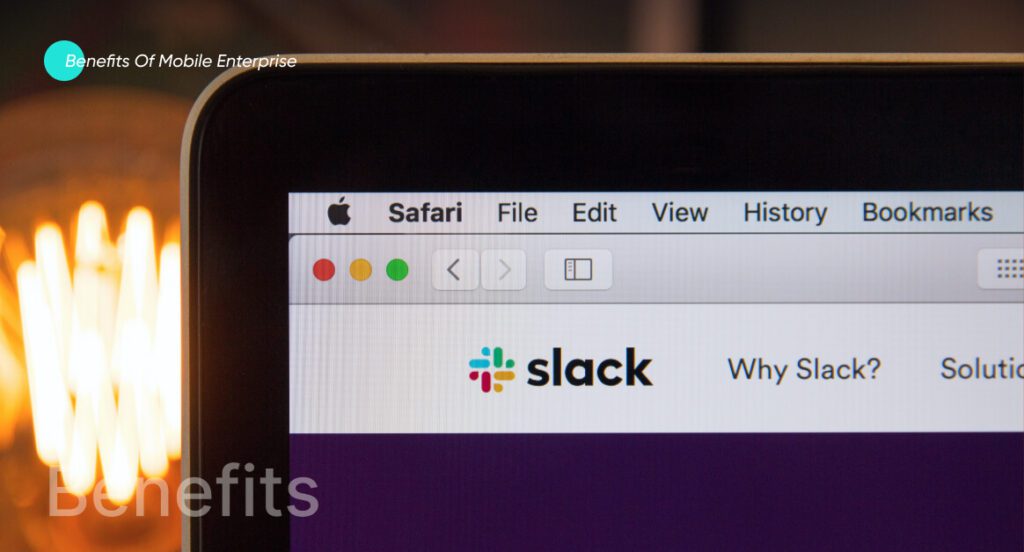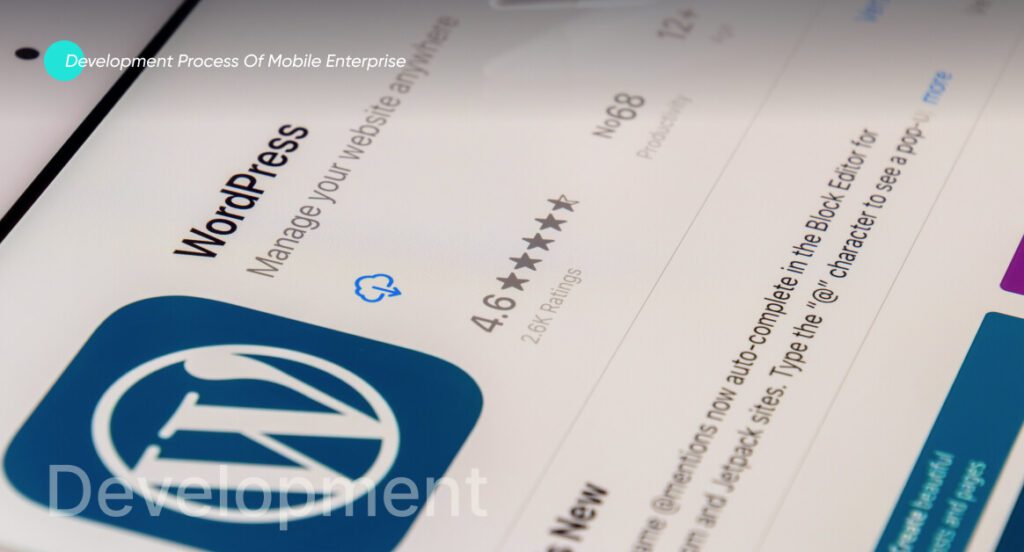Why are Mobile Enterprise Applications Crucial for Businesses?
Mobile enterprise applications are designed explicitly for enterprise-sized businesses, governments, and large-scale NGOs. These apps aim to automate and run core operations (sales, inventory, finance, human resources, manufacturing, etc.) of companies through a single app, enabling smooth workflows and reducing work complications. Enterprise apps can benefit business organizations through workflow automation, enhance employee efficiency, and even help save money.
With the groundbreaking adoption and use of mobile technology worldwide due to its myriad advantages, large enterprises have also shown genuine interest in mobile enterprise app development. According to research, the mobile enterprise app market size is projected to reach USD 268.14 billion by 2030. If your company needs a mobile enterprise app, read this article as it explores various facets of its development.
Types of Mobile Enterprise Applications
The following are three primary types of mobile enterprise applications.

1. Employee Level
Employee-level apps are characterized by having the shortest number of features as they are created to automate internal operations. These apps can assist managers in checking all the crucial information relevant to projects, minimizing delays, and delivering projects on time.
2. Department-Level
Department-level enterprise mobile apps are designed for employees and to serve their specific needs in specific departments. For instance, company-level mobile apps can help sales managers keep track of their sales and enable customer service representatives to communicate with customers.
3. Company-Level
These apps connect numerous departments in a company through a single network. Company-level apps enable collaboration and communication between managers and their employees. They also provide access to crucial resources such as databases, documents, and other essential tools.
Benefits of Mobile Enterprise Applications

Mobile enterprise apps offer various benefits to businesses, such as providing automation and enabling efficiency. The following is a comprehensive assessment of the key benefits of enterprise apps.
1. Enhanced Productivity
Enterprise mobile apps streamline business operations and automate tasks. In addition, they facilitate communication between managers and employees and provide them access to critical information. All these factors lead to well-planned completion of tasks, maximizing productivity.
2. Workflow Efficiency
Enterprise mobile apps boost collaboration and communication, incorporating employees into a unified platform. These apps have features like project management, document sharing, and communication toolkit, which can connect remote employees and promote team workflow.
3. Competitive Edge
Businesses that choose enterprise app development can boost their productivity and efficiency through task automation and workflow optimization. It can also make these businesses susceptible to market trends and ensure better customer service, giving them a competitive edge over their rivals.
4. Cost-Effectiveness
An enterprise mobile app will require an initial investment; however, the app tends to save costs in the long run. The app helps businesses automate tasks, streamline processes, and reduce employee expenses, leading to cost reduction.
5. Better Human Resource Management
Another advantage of enterprise apps is the convenience they offer for HR management. An enterprise can enable HR management to connect with employees anywhere and anytime. Another beneficial feature of the enterprise is that it can efficiently perform the function of absences and payroll management.
6. Improved Customer Service
Apart from bolstering the internal operations of a business, enterprise apps can also play an instrumental role in improving customer service. For example, customer relationship management software (CRM) can assist in offering more personalized service to customers, increasing efficiency and productivity.
7. Enhanced Data Management
Enterprise mobile apps also assist in better data management. These apps allow employees to access data from a single source without delay. It can also improve processes like data processing, verification, and analysis.
8. Robust Security
Enterprise apps offer robust security and data encryption measures to safeguard sensitive data. These apps protect against data breaches and ensure the authenticity of the data.
9. Customization
Businesses can customize enterprise mobile apps using a user-centric approach to serve their customers. The app’s tailored solutions can enable enterprises to synchronize their processes, workflows, and goals with a company’s branding, identity, and goals. It can help to embolden a company’s professional image and offer the best user experience.
10. Integration
Enterprise mobile apps also allow seamless access to data and information across an organization. In addition, this integration also leads to optimized workflows, which can lessen data inaccuracies and provide a comprehensive view of crucial information to make insightful decisions.
Enhance efficiency and productivity. Let’s build your tailored enterprise app together. See Our Mobile App Development Services Now! ![]()
Features of Mobile Enterprise Applications

Enterprise mobile apps are designed to serve the particular needs of businesses. Their features play a crucial role in helping companies to achieve their goals. The following is a list of vital elements of mobile enterprise applications.
1. Security
Robust security measures safeguard mobile enterprise applications. These apps use two-factor and multi-factor authentication, data encryption, and protection measures to protect classified information.
2. Offline Availability
Another notable feature that can give you a competitive advantage includes offline access to the enterprise app. Employees can check and update data without an internet connection. This feature offers extra convenience when using the app.
3. Push Notifications
Push notifications can inform your employees about crucial events, tasks, and alerts. This feature helps deliver critical information. You can also use this feature to promptly send important notifications to your potential customers.
4. Instant Messaging
The primary purpose of this feature is to enable seamless connectivity between the employees of a business. This feature allows real-time messaging and chat between the employees, ensuring smooth connectivity.
5. Analytics
Mobile enterprise applications provide real-time analysis for accurate data processing capabilities. Similarly, users can access reports and analytics dashboards and use critical data for prudent decision-making.
6. Integration
Integrating APIs with business systems and software enables mobile enterprise apps to exchange data and sync with databases, CRM systems, ERP systems, and more. In addition, single-sign-on (SSO) capabilities allow company employees to effortlessly access various enterprise apps with one set of login credentials.
7. Cross-Platform Compatibility
Primarily, mobile enterprise apps are developed to offer cross-platform compatibility. Generally, these apps are available on multiple platforms, such as iOS, Android, and the web, and various devices, such as smartphones, tablets, and desktops.
8. Compliance
At times, enterprise apps have built-in data security and privacy capabilities that ensure a company’s compliance with industry-specific regulations and rules. For instance, your app might include HIPAA (Health Insurance Portability and Accountability Act) compliance if you run a healthcare company. On the other hand, if you have an enterprise app about a financial organization, your compliance might include GDPR (General Data Protection Regulation).
Development Process of Mobile Enterprise Applications

Mobile enterprise app development is a multiphase process requiring deep expertise and meticulous planning. Therefore, enterprise app developers should have an in-depth knowledge of the core stages of the development process.
1. Discovery
The first stage requires you to scrutinize the app’s idea and ponder what problems your app can solve. You will also need to clearly define business goals underpinning the concept of an enterprise app. In addition, you will also need to analyze your target audience.
2. Wireframes
In the second stage, you will work on developing the prototype model for the app, which will highlight the functionalities and features of the app. It will provide a visual representation of how your app will look in the future and allow you to make required changes cost-effectively.
3. UI/UX Design
Your development team selects the appropriate technology stack for your app. Then, design the user interface (UI) and user experience (UX) to ensure the app is user-friendly, intuitive, and responsive. Ensure that your app is rooted in simplicity and offers straightforward navigability. In addition, create a database schema and explain data storage requirements.
4. Development
It is the core stage for the enterprise mobile application development. Your development team works on front-end development by developing the user interface and functionalities using web or native technologies, depending on the platform. They also work on the back-end development by building the server-side logic, APIs, and database elements using suitable programming frameworks. The development team concludes this stage by integrating the app with other systems and services through apt APIs.
5. Testing and Deployment
In this stage, your Quality Assurance engineers rigorously test the app. Firstly, they perform manual testing to check if the app meets the requirements. Secondly, they perform automated testing to check if the app’s features, performances, and security work seamlessly. Thirdly, the QA team performs load and performance testing to check the app’s performance and scalability under various conditions. After your QA team approves, your enterprise is ready to be deployed on the app stores.
See our latest Relevant Exploration How to Evaluate Mobile App Development Costs? ![]()
Mobile Enterprise Application Development Cost

Although it is impossible to reveal the exact price of mobile enterprise app development, each project has specific requirements, features, budget, and development team, among others. Nevertheless, we can still calculate a general estimate of the total cost. According to estimates, the average price for enterprise app development with basic features is around $90,000. Contrarily, a feature-rich enterprise app can cost you around $400,000.
Geographically, the development teams based in North America, Western Europe, and Australia tend to charge exorbitantly. In comparison, the development teams based in Eastern Europe, Latin America, and India charge relatively low.
FAQ
Some leading examples of mobile enterprise apps include Slack, Asana, Zoom, and Trello.
Field service and maintenance, healthcare, and retail/e-commerce industries are the industries that have greatly benefited from mobile enterprise apps.
Advanced mobile enterprise applications integrate dynamic security measures. Typically, it includes encryption, authentication, and remote data wiping to protect sensitive business information.
Many mobile enterprise apps are designed to integrate seamlessly with existing systems, such as CRM, ERP, and databases. Integration is crucial for maintaining data consistency and enabling efficient workflows.
Mobile enterprise apps reduce the need for paper-based functions, bolster eco-friendly practices and sustainability, and reduce ecological footprint.
Gohar is a seasoned IT writer specializing in leading technologies. He holds a Diploma and Bachelor's degree from the University of London, with professional experience spanning over five years in the IT sector. His expertise involves a keen focus on mobile applications, web apps, blockchain, content management systems, e-commerce, and fintech. Beyond the professional field, Gohar is an avid reader and reads extensively about emerging and innovative technologies.